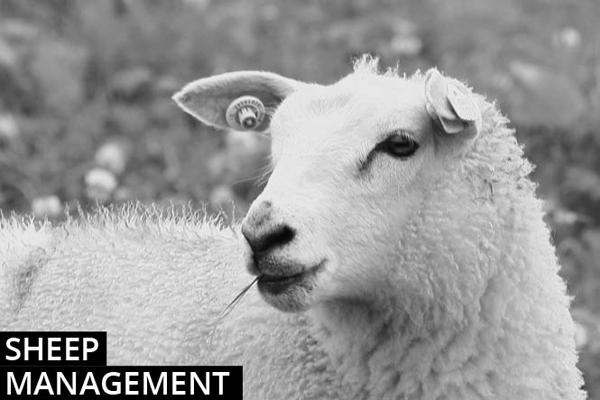Farmers find merits in both systems. Gradual weaning, where a number of ewes are removed from the flock, tends to reduce stress, with fewer lambs unsettled. The downside here is where ewes and lambs are grazing poor-quality swards, with performance in weaned lambs hit harder. There is also a labour component in flocking animals, but many combine this with weighing and drafting lambs, which balances this. Abrupt weaning, whereby all lambs are separated from ewes in one go, can lead to higher stress levels at first, but lambs generally settle quickly. Disruption is minimised where lambs have access to high-quality leafy swards, which also limits any setback in performance. It is important to manage ewes appropriately in the immediate period post weaning. This can include temporarily housing ewes or tightening on a bare paddock to reduce milk yield.
Weaning is also the ideal time to identify aspects such as ewes with pendulous udders or lumps in their udder. Once weaned, the mistake is frequently made of failing to take remedial action quick enough with ewes that have lost excessive weight during lactation. These ewes should be prioritised and allowed access to better-quality grazing to regain condition, while ewes requiring maintenance feeding can be used to graze out paddocks and improve quality of regrowth.
Dates for the diary
There are two good dates for the diary in the next week. Teagasc are holding a Grass10 sheep farm walk this Friday on the farm of PJ Finnerty, Brideswell, Athlone, Co Roscommon, at 2pm. These events, as demonstrated on page 39, are an excellent chance to see improved systems of grassland management on a commercially-run farm. On Wednesday 21 June, there is a major sheep event taking place in Teagasc Mellows Campus Athenry. Practically every aspect of sheep production will be discussed, including grass-based systems of lamb production, breeding evaluations and genomic selection, flock health (parasitology, mineral nutrition and lamb mortality) and hill sheep production. Information will be delivered in numerous formats, with farmers giving their experience of the Teagasc BETTER Farm Sheep Programme, while there will be a series of workshops and practical demonstrations – with a theme of health and safety also prevalent across all topics. As detailed on page 14, there will be in-depth detail on performance in the research demonstration flocks and the INZAC flock, along with other research updates. The event is an approved knowledge transfer event, which opens at 11am and runs until 5pm. The last groups led by Teagasc advisors will commence the circuit at 2pm.
Sheep management notes
High-output sheep systems give €500/ha net margin
Lamb prices up €5/head
Farmers find merits in both systems. Gradual weaning, where a number of ewes are removed from the flock, tends to reduce stress, with fewer lambs unsettled. The downside here is where ewes and lambs are grazing poor-quality swards, with performance in weaned lambs hit harder. There is also a labour component in flocking animals, but many combine this with weighing and drafting lambs, which balances this. Abrupt weaning, whereby all lambs are separated from ewes in one go, can lead to higher stress levels at first, but lambs generally settle quickly. Disruption is minimised where lambs have access to high-quality leafy swards, which also limits any setback in performance. It is important to manage ewes appropriately in the immediate period post weaning. This can include temporarily housing ewes or tightening on a bare paddock to reduce milk yield.
Weaning is also the ideal time to identify aspects such as ewes with pendulous udders or lumps in their udder. Once weaned, the mistake is frequently made of failing to take remedial action quick enough with ewes that have lost excessive weight during lactation. These ewes should be prioritised and allowed access to better-quality grazing to regain condition, while ewes requiring maintenance feeding can be used to graze out paddocks and improve quality of regrowth.
Dates for the diary
There are two good dates for the diary in the next week. Teagasc are holding a Grass10 sheep farm walk this Friday on the farm of PJ Finnerty, Brideswell, Athlone, Co Roscommon, at 2pm. These events, as demonstrated on page 39, are an excellent chance to see improved systems of grassland management on a commercially-run farm. On Wednesday 21 June, there is a major sheep event taking place in Teagasc Mellows Campus Athenry. Practically every aspect of sheep production will be discussed, including grass-based systems of lamb production, breeding evaluations and genomic selection, flock health (parasitology, mineral nutrition and lamb mortality) and hill sheep production. Information will be delivered in numerous formats, with farmers giving their experience of the Teagasc BETTER Farm Sheep Programme, while there will be a series of workshops and practical demonstrations – with a theme of health and safety also prevalent across all topics. As detailed on page 14, there will be in-depth detail on performance in the research demonstration flocks and the INZAC flock, along with other research updates. The event is an approved knowledge transfer event, which opens at 11am and runs until 5pm. The last groups led by Teagasc advisors will commence the circuit at 2pm.
Sheep management notes
High-output sheep systems give €500/ha net margin
Lamb prices up €5/head






 This is a subscriber-only article
This is a subscriber-only article










SHARING OPTIONS: